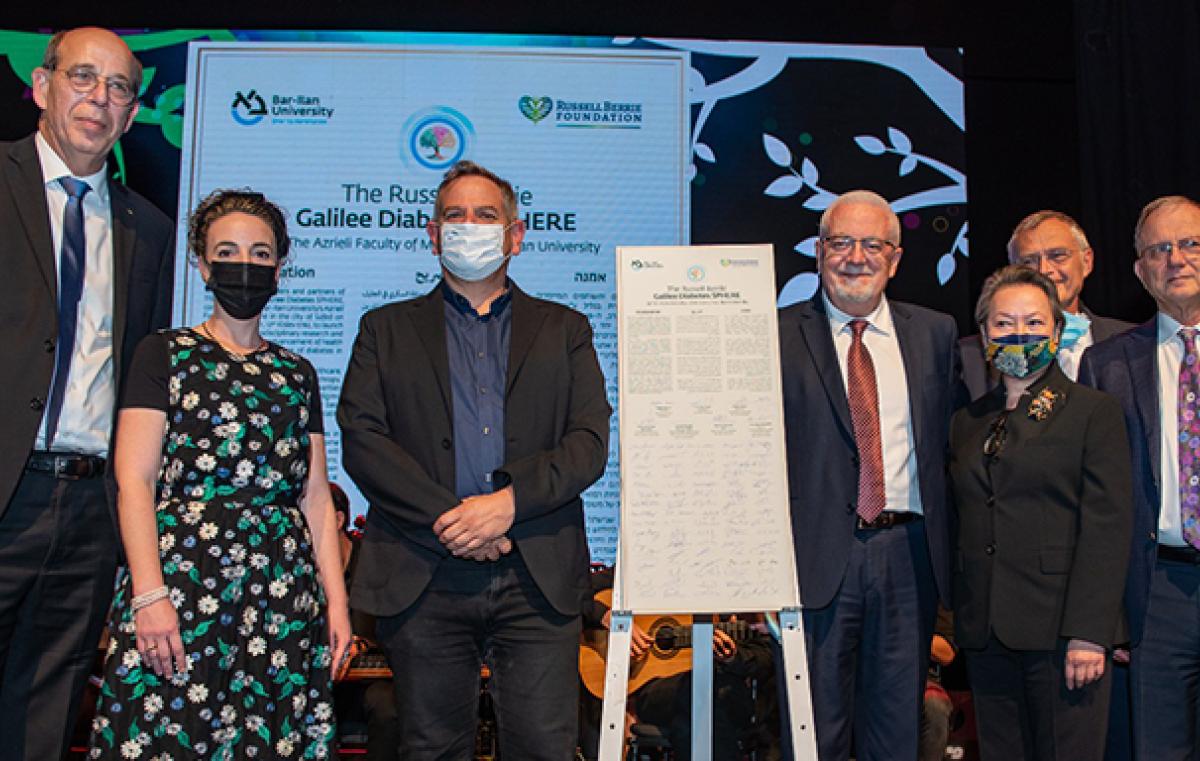Diabetes SPHERE Dedication Ceremony
Watch a recap of the ceremony that was attended by prominent academics, politicians and societal leaders

The launch event of The Russell Berrie Galilee Diabetes SPHERE was attended by 200 people, including Minister of Health Nitzan Horowitz, MK Idit Silman, regional council heads, Angelica Berrie, President of The Russell Berrie Foundation and Foundation officials, Bar-Ilan University President Prof. Arie Zaban, Permanent Committee Chairman Shlomo Zohar, Prof. Naim Shehadeh, Azrieli Faculty of Medicine Dean Prof. Karl Skorecki, and others.
Today there are 170,000 people suffering from diabetes in the Galilee and 250,000 diagnosed with prediabetes, more than a quarter of the total population diagnosed in Israel. The Russell Berrie Galilee Diabetes SPHERE, led by BIU’s Azrieli Faculty of Medicine in Safed, combines research and treatment, interfacing academia and the community, in order to improve lifestyle, and prevent and reduce morbidity and complications caused by diabetes. The initiative will initially focus on five cities in the Galilee: Safed, Shefar’am, Nof Hagalil, Sakhnin and Nazareth. Its directors aim to reduce by fifty percent the number of prediabetics who become diabetics in these localities.
Minister of Health Nitzan Horowitz thanked the Russell Berrie Foundation for its contribution and Bar-Ilan University for its commitment to the issue, adding: "You are doing a wonderful thing here. This project will address one of the most difficult health problems in the north. It is an example and a model for the north, for Israeli society and for the world. As you know we have a big human resources crisis in medicine and, at the last minute, the Faculty mobilized this year to accept an additional 20 students. This will happen again next year, as well, until we narrow this gap. We will also invest in the Ziv Medical Center in Safed with special equipment and an internship pilot will begin here in the north."
MK Idit Silman, Health Committee Chair and Coalition Chairwoman said, "Tonight, a major effort to reduce morbidity rates and to become a leader in the field of diabetes begins. I ask you to expand the project to the entire country, and to become a leading center of knowledge on an international level. This is the connection we need between academia and the field. The Russell Berrie Foundation is creating a dream here. Diabetes is a top priority for the government.”
Prof. Naim Shehadeh, one of the top diabetes experts in Israel and president of the Israeli Diabetes Association, will head the initiative's Scientific Council. He stated that the leaders of the project will use all the tools at their disposal to reduce by fifty percent the number of prediabetics who become diabetic. “We also intend to significantly reduce the number of patients with blood sugar imbalance by providing adequate care and guidance for adopting a healthy lifestyle. Achieving this goal will significantly reduce the risk of developing the dangerous complications of diabetes."
Dr. Sivan Spitzer, an expert in implementing practices aimed at reducing health disparities and deputy director of the initiative, said: "The connection between social standing and the high rate of diabetes in the Galilee is already well known, and a similar situation can be seen on a global level. Disparities in morbidity rates between the center of the country and the periphery are due to a combination of medical and social factors, such as literacy, education, and income, and this affects health and lifestyle. We can't separate the health perspective from an understanding of social standing, based on where a person is raised and where he/she lives. In today's world the integration between clinical and social status is the key to understanding the source of these disparities."
Bar-Ilan University President Prof. Arie Zaban noted that “The Azrieli Faculty of Medicine was established to change the face of Israel's northern periphery – to promote public health and medical services, to make science studies accessible to students, and to empower the community. SPHERE will be the first model of its kind in the world for the study of chronic diseases in geographical and social peripheries, for the creation of multidisciplinary and multi-sectoral partnerships, and a source that will yield innovative avenues of social investment return. We anticipate that the SPHERE model will be replicated in other fields, as well, and will serve as an effective tool for achieving additional national goals."
Azrieli Faculty of Medicine Dean Prof. Karl Skorecki, initiated The Russell Berrie Galilee Diabetes SPHERE with the understanding that inequality adversely affects our ability to treat and deal with chronic diseases, including diabetes.